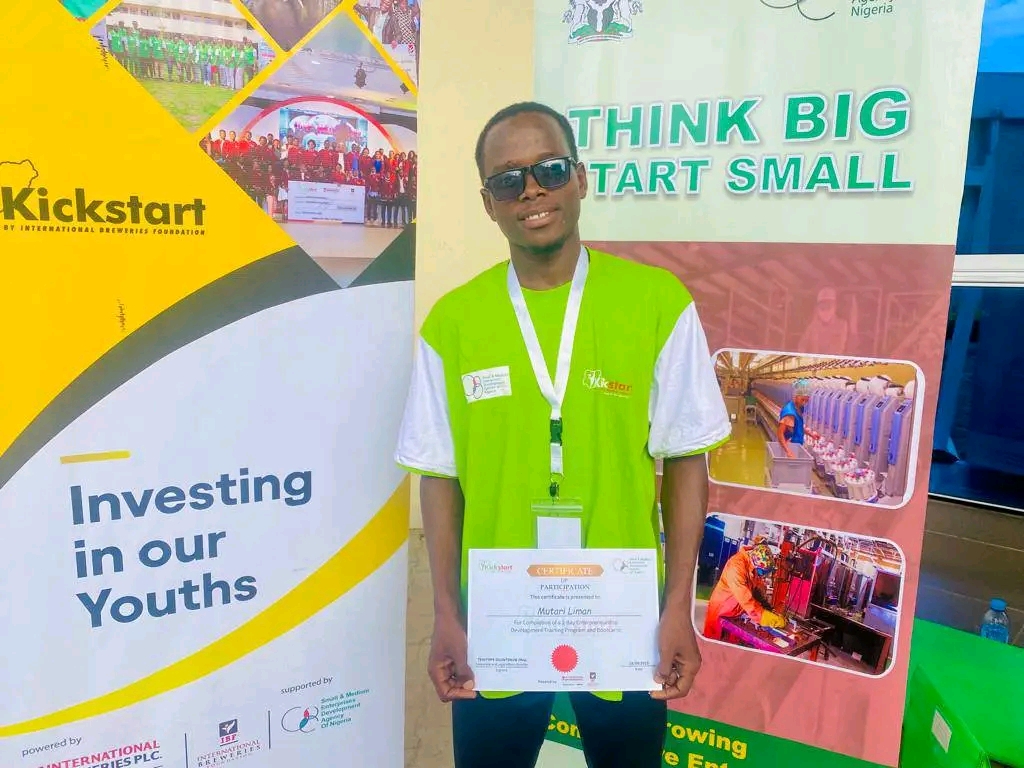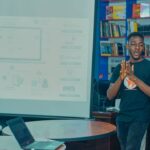Born in Yandutse, a community in Ringim Local Government Area of Nigeria’s Jigawa State, Muntari Liman faced severe bouts of fever, which were later diagnosed as otitis media, an inflammation in the middle ear.
“I was told that the illness may be otitis media. As a child, I experienced many diseases that I cannot remember. But the illnesses never happened again after I lost my sense of hearing,” Liman recounted.
Liman is one of the 9.5 million Nigerians estimated to be deaf, according to the UN. Having lost his sense of hearing during his formative years, the 25-year-old was forced to quit school. But a relative soon found a school for hearing-impaired children in Hadejia Local Government Area within the same Jigawa State and advised Liman’s parents to enroll their son there.
“My parents asked me if I would like to be there, and I told them yes. Because I was tired of staying at home without going to school,” Liman said.
At the School for the Hearing Impaired in Hadejia, Liman dedicated his time to studies, drawing inspiration from his colleagues who came from many different backgrounds and cultures. Being exposed to students of multiple cultures transformed Liman into a better person and gave him more experiences and knowledge than he had hoped for.
In 2017, Liman took the Senior School Certificate Examination, or SSCE and the Unified Tertiary Matriculation Examination, or UTME, passing with flying colours. Soon he secured admission to Bayero University in Kano for a course in special education and geography, and Liman could hardly contain his excitement. But his joy was short-lived. A relative who had pledged to sponsor his studies at university suddenly backed out of his promise.
Crestfallen, Liman thought to decline the admission but his parents wouldn’t hear of it. They rented out their farmland and gave the proceeds to Liman to pay his registration fee at the university. As soon as Liman completed his freshman year, he embarked on a journey to Lagos, Nigeria’s commercial capital, to hustle for money that would sustain him through his third year.
“Towards my final year, I became an N-Power beneficiary and that was how my life started improving. I also ventured into wheat farming to help finance my education till my graduation,” Liman told Prime Progress.
Going to a public university as a hearing-impaired student proved arduous for Liman, who found it challenging to find peers who understood sign language and could adequately interpret what the lecturers were saying in class for him. Sometimes, he found help in his friend, whom he had taught sign language. Yet more often than not, Liman depended on lecturers’ handouts or notes he had copied from his colleagues to prepare for exams.
“During my secondary school days, there was poor equipment for us to receive practical training and the school didn’t offer science subjects because there were people who believed that since we are deaf, there is no need for us to study science subjects, and that sounds like a discrimination to us,” Liman narrated.
He added that “even during my final year project, I met a bad supervisor who never gave me special accommodation due to my deafness. He took me as if I was a normal person while he didn’t know how to communicate with us deaf in sign language.”
Amid the odds, Liman graduated from university in 2023 and was promptly dispatched for the National Youth Service Corps, or NYSC in November of the same year. This makes him the second person in his family to graduate from university, according to Liman.
Muntari Liman has screwed all stereotypes as he teaches now at the Special Education School in Kumbotso Local Government Area of Nigeria’s Kano State, where he was deployed to. He finds delight in recalling some of his sweet moments when families from his hometown appreciate his parents for giving him the chance to study, unlike other people with disabilities who invariably end up begging for alms in the street.
Today, Liman is a Senior Special Assistant on Disability Matters to the Chairman of his hometown in Jigawa State. As he continues to push against all odds, Liman dreams of collaborating with more government stakeholders to provide accessible education and employment for persons living with disabilities in Nigeria
“I also want to work alongside nonprofits to empower persons with disabilities,” he said.
Muntari Liman, from Yandutse in Nigeria's Jigawa State, struggled with fever in his childhood, later diagnosed as otitis media, leading to hearing loss. As one of the estimated 9.5 million deaf Nigerians, his education was interrupted, but his parents enrolled him in a school for hearing-impaired children in Hadejia, where he thrived despite the challenges.
After excelling in his exams, Liman gained admission to Bayero University but faced financial difficulties when his relative withdrew promised support. His parents rented out their farmland to pay for his university fees. Liman also took up various jobs, including wheat farming and a beneficiary of the N-Power program, to fund his studies.
As a hearing-impaired student at a public university, Liman faced additional challenges due to a lack of sign language interpreters and adequate support. Despite these hurdles, he graduated in 2023 and was assigned to the National Youth Service Corps.
Now a Senior Special Assistant on Disability Matters in his hometown, Liman works at the Special Education School in Kumbotso and is committed to improving education and employment opportunities for people with disabilities. He aims to collaborate with government stakeholders and nonprofits to empower disabled individuals in Nigeria.






